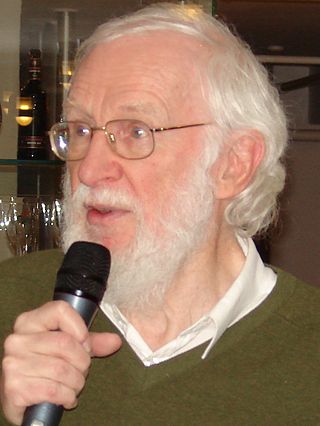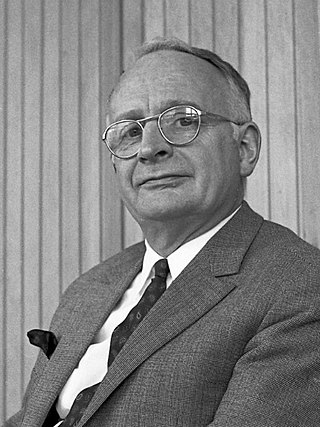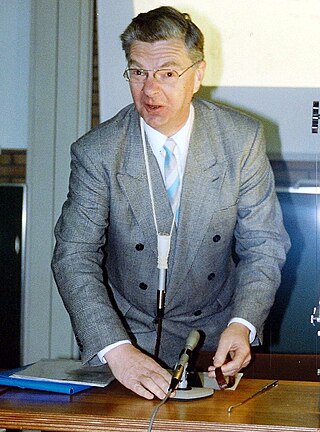Related Research Articles

Niklaus Emil Wirth is a Swiss computer scientist. He has designed several programming languages, including Pascal, and pioneered several classic topics in software engineering. In 1984, he won the Turing Award, generally recognized as the highest distinction in computer science, for developing a sequence of innovative computer languages.

Peter Naur was a Danish computer science pioneer and Turing award winner. He is best remembered as a contributor, with John Backus, to the Backus–Naur form (BNF) notation used in describing the syntax for most programming languages. He also contributed to creating the language ALGOL 60.

Stephen Richard "Steve" Bourne is an English computer scientist based in the United States for most of his career. He is well known as the author of the Bourne shell (sh), which is the foundation for the standard command-line interfaces to Unix.
In systems engineering, dependability is a measure of a system's availability, reliability, maintainability, and in some cases, other characteristics such as durability, safety and security. In real-time computing, dependability is the ability to provide services that can be trusted within a time-period. The service guarantees must hold even when the system is subject to attacks or natural failures.

Adriaan "Aad" van Wijngaarden was a Dutch mathematician and computer scientist. Trained as a mechanical engineer, Van Wijngaarden emphasized and promoted the mathematical aspects of computing, first in numerical analysis, then in programming languages and finally in design principles of such languages.
David A. Turner is a British computer scientist. He is best known for designing and implementing three programming languages, including the first for functional programming based on lazy evaluation, combinator graph reduction, and polymorphic types: SASL (1972), Kent Recursive Calculator (KRC) (1981), and the commercially supported Miranda (1985). Miranda had a strong influence on the later Haskell.

Friedrich Ludwig "Fritz" Bauer was a German pioneer of computer science and professor at the Technical University of Munich.
Eric "Rick" C. R. Hehner is a Canadian computer scientist. He was born in Ottawa. He studied mathematics and physics at Carleton University, graduating with a Bachelor of Science (B.Sc.) in 1969. He studied computer science at the University of Toronto, graduating with a Master of Science (M.Sc.) in 1970, and a Doctor of Philosophy (Ph.D.) in 1974. He then joined the faculty there, becoming a full professor in 1983. He became the Bell University Chair in software engineering in 2001, and retired in 2012.
John Edward Lancelot Peck was the first permanent Head of Department of Computer Science at the University of British Columbia (UBC). He remained the Head of Department from 1969 to 1977.
Richard Simpson Bird was an English computer scientist.
Lambert Guillaume Louis Théodore Meertens or L.G.L.T. Meertens is a Dutch computer scientist and professor. As of 2020, he is a researcher at the Kestrel Institute, a nonprofit computer science research center in Palo Alto's Stanford Research Park.
Thomas Stephen Edward Maibaum Fellow of the Royal Society of Arts (FRSA) is a computer scientist.
Allen William Mark (Doc) Coombs was a British electronics engineer at the Post Office Research Station, Dollis Hill.
Charles Carroll Morgan is an American computer scientist who moved to Australia in his early teens. He completed his education there, including a Doctor of Philosophy (Ph.D.) degree from the University of Sydney, and then moved to the United Kingdom in the early 1980s. In 2000, he returned to Australia.

Jeremy Gibbons is a computer scientist and professor of computing at the University of Oxford. He serves as Deputy Director of the Software Engineering Programme in the Department of Computer Science, Governing Body Fellow at Kellogg College and Pro-Proctor of the University of Oxford.
Eiiti Wada is a computer scientist and emeritus professor at the University of Tokyo and the Research Director of Internet Initiative Japan (IIJ), a computer network technology company. He is one of the creators of the Happy Hacking Keyboard.
IFIP Working Group 2.1 on Algorithmic Languages and Calculi is a working group of the International Federation for Information Processing (IFIP).

Michel Sintzoff was a Belgian mathematician and computer scientist.
Yanhong Annie Liu is a computer scientist and professor of computer science at Stony Brook University where she works on new programming languages, software systems, algorithms, program design, optimizing, analysis, and transformations, intelligent systems, distributed computing systems, and computer security.
References
- 1 2 "SIGCIS profiles". Archived from the original on 14 October 2008. Retrieved 17 October 2008.
- ↑ Wales, The Learned Society of. "Brian Randell". The Learned Society of Wales. Retrieved 31 August 2023.
- ↑ Jeuring, Johan; Meertens, Lambert; Guttmann, Walter (17 August 2016). "Profile of IFIP Working Group 2.1". Foswiki. Retrieved 6 September 2020.
- ↑ Swierstra, Doaitse; Gibbons, Jeremy; Meertens, Lambert (2 March 2011). "ScopeEtc: IFIP21: Foswiki". Foswiki. Retrieved 6 September 2020.
- ↑ Randell, Brian (22 July 2007). "Informal Pages". School of Computing. University of Newcastle. Retrieved 18 August 2020.
- ↑ Randell, Brian. Uncovering Colussus. Archived from the original on 12 December 2021.
- ↑ Brian Randell. "The Computer Pioneers". YouTube . Archived from the original on 12 December 2021.
- ↑ Randell, Brian. The Computer Pioneers. Archived from the original on 12 December 2021.
- ↑ COLOSSUS and the History of Computing: Dollis Hill’s Important Contribution by A.W.M. Coombs in The Post Office Electrical Engineers’ Journal (POEEJ; Volume70, 1977/78 part 2, July 1977, pages 108-110)
- ↑ Brownbridge, David R.; Marshall, Lindsay F.; Randell, Brian (1982). "The Newcastle Connection" (PDF). Software: Practice and Experience. 12: 1147–1162. doi:10.1002/spe.4380121206. S2CID 1840438. Archived from the original (PDF) on 16 August 2016. Retrieved 16 August 2016.
- ↑ Callaghan, Brent (2000). NFS Illustrated. Addison Wesley. ISBN 0-201-32570-5.
- ↑ Brian Randell at School of Computing Science. Last updated March 2008. Retrieved 17 October 2008.
- ↑ Randell, Brian (11 April 2003). "Northern Informatics Applications Agency". School of Computing. University of Newcastle. Retrieved 18 August 2020.
- ↑ Brian Randell Publications.